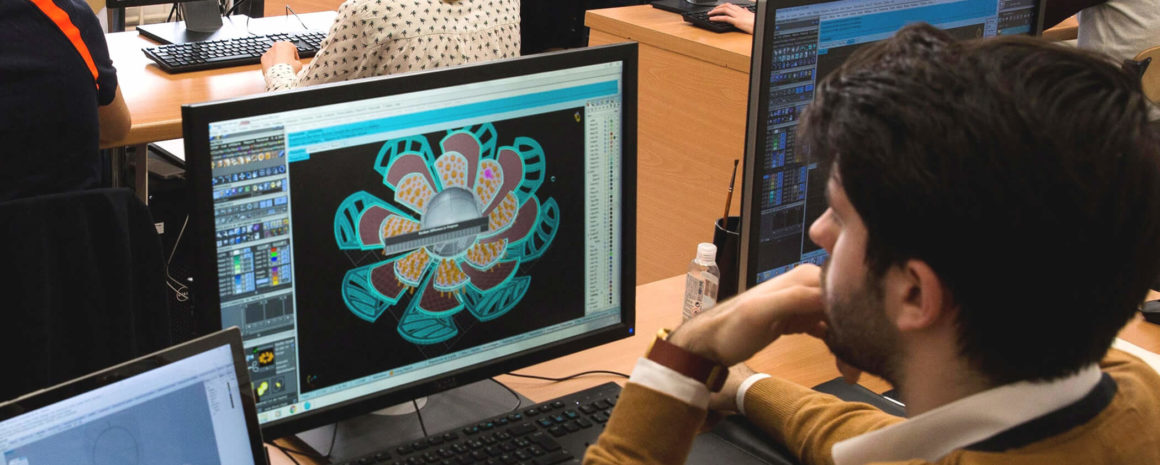Recruiting an apprentice
You are a company in the Jewellery sector, and want to recruit a new employee who will be able to train in your specific techniques. Combined study/on-the-job training is the ideal response to your needs.
RECRUITING AN APPRENTICE
The recruitment process, step by step
- Apprentices from Jewellery Schools are selected through an aptitude test that certifies their ability to perform all the duties in the Jewellery business, with: precision and quality of execution, but also concentration, logic and speed.
- You can request the list of the top 30 candidates from the aptitude test and take the initiative to recruit them or view our Employment Page; we also ask our students to prove their dedication and motivation by individually conducting their search for a host company.
- You have our candidates come in for a recruitment interview and select the profile of your choice ; our students leave you documentation including the details you will need to contact our centre, should you require any further information.
- You contact our team at +331.40.26.98.00 and receive guidance about the potential for contracts and all the benefits your company can enjoy.
- You sign an apprenticeship contract or a professionalisation contract with your apprentice. Your apprentice is ready to join your company. See also our Frequently Asked Questions to find out more about work-study programs.
The national diplomas toward which our apprentices work certify them in various specialities so that you can recruit according to your criteria
- In the Jewellery Arts and Techniques CAP programme, your apprentice spends 3 days a week at your company and 2 days at the training centre, for a period of two years. Candidates with a CAP are certified proficient in jewellery making and graphic representation techniques.
- In the Additional distinction in Jewellery programme, your apprentice spends 3 days a week in your company and 2 days at the training centre, for a period of one year. A candidate with an Additional Distinction in Jewellery is a professional who is proficient in jewellery execution and preparation of gem placement on the jewels. The programme includes work in a team. Tasks include producing and mounting jewellery.
- In the Jewel DMA programme, your apprentice spends 2.5 days a week in your company and 2.5 days at the training centre, for a period of two years. At the end of the DMA, the graduate is a skilled Designer/Creator of Jewellery.
Contract
Two types of contracts exist for work-study training, adapted to the profile of the learner and the company.
Work-study training is based on principle of splitting working hours between the training centre and the company. It enables your apprentice to quickly become operational and develop his or her potential in your environment.
Does your company have a Jewellery workshop? You can recruit with an apprenticeship contract, or, if you wish, a professionalisation contract.
Are you a Costume Jewellery Company? Recruit one of our students taking advantage of the professionalisation contract system.
Calculate your apprentice’s salary with the Work-Study Portal
Understanding the differences between the two contracts
The apprentice receives a fixed remuneration as a percentage of the minimum interprofessional growth wage (SMIC).
The apprentice’s salary is fully or partially exempt from social security contributions.
Apprenticeship contract
The apprenticeship contract for degree work done at the Jewellery Apprentice Training Centre (CAP, Additional Distinction or DMA) is a fixed-term one- to two-year contract.
Professionalisation contract
The professionalisation contract for degree work done at BJO Formation (CAP, Additional Distinction and BMA) is a fixed-term one- to two-year contract.
Documentation
You are the apprentice master at your company to an apprentice from the Haute École de Joaillerie
The apprentice master is directly responsible for the apprentice’s training in the company, acting as mentor.
The apprentice master helps the apprentice within his or her company gain the skills needed for the qualification sought and the degree or diploma being prepared, in regular contact with Haute École de Joaillerie CFA.
The apprentice master must:
- Be of legal age
- Show all compliance guarantees
- Fulfil the skills requirements, which are defined in terms of diplomas and years of experience
Each year at the Haute École de Joaillerie CFA, a meet-up evening is organised between apprenticeship mentors, students and teachers at the start of the academic year. The teachers also visit the apprentices in their company during the year, to interact with the apprenticeship mentor about their integration and vocational training. Lastly, throughout the year, the apprentice’s log is used to maintain a constant tie between the company and the Haute École de Joaillerie.
Your company wishes to host an apprentice on an apprenticeship contract
- You can calculate your apprentice’s salary on the work-study portal
- You can print out an apprenticeship agreement and fill it out thanks to the user instructions
- You will find the answers to your questions on the employment site
- Your company wishes to host an apprentice on a professionalisation contract
Your company wishes to host an apprentice on an professionnalisation contract
- You can calculate your apprentice’s salary on the work-study portal
- You can print out a professionalisation contract and fill it out thanks to the user instructions
- You will find the answers to your questions on the employment site
Aides
Recruiting on a work-study basis allows you to benefit from certain benefits and certain aids.
Assistance for the apprenticeship contract
– A flat-rate compensation paid by the Region amounting to a minimum of €1,000.
– Financial aid: An incentive bonus for training disabled apprentices equal to 520 times the hourly minimum wage applicable on the first day of July inclusive, in the first year of apprenticeship.
Exemption from social security contributions :
- A total exemption from employer and wage contributions of legal and contractual origin (with the exception of those due in respect of occupational accidents and illnesses) for companies with fewer than 11 employees (not including apprentices) and employers registered in the Trade Register (or, in Alsace-Moselle, in the company directory).
- A partial exoneration from employer social contributions (it only concerns social insurance contributions: sickness, maternity, disability, death and old-age, and family subsidies) for other companies
– An apprenticeship tax credit equal to the income of €1,600 by the average annual number of apprentices.
Grants under the professionalisation contract
– Financial aid:
- Flat-rate financial assistance to the employer for any recruitment of job seekers ages 26 and over who have difficulties integrating a sustainable job, amounting to €2,000.
- Financial assistance for hiring a job seeker 45-year-old and above, amounting to €2,000.
– exemptions from social charges :
- Exemption from employer contributions to sickness, maternity, old-age and family allowances insurance for professionalisation contracts concluded with job-seekers aged 45 and over.
- In other cases, there is no specific exemption from employer contributions, but the company may benefit from the general reduction in employer Social Security contributions known as the “Fillon Reduction”.








